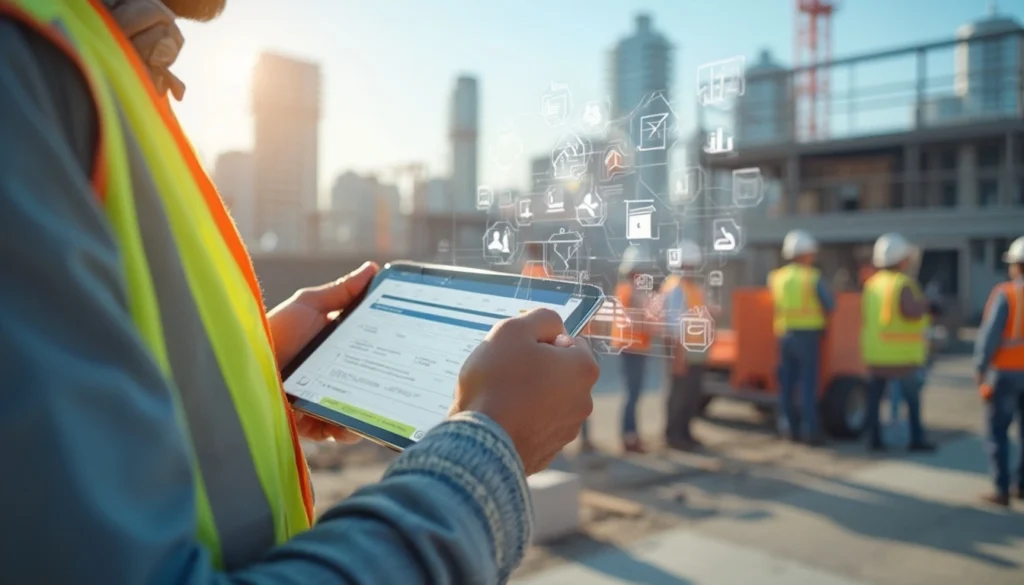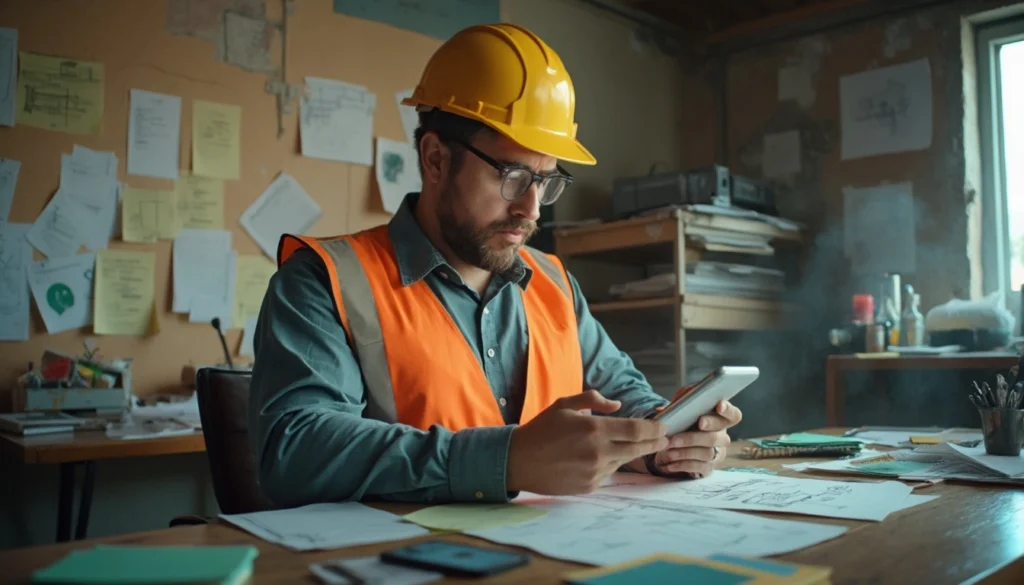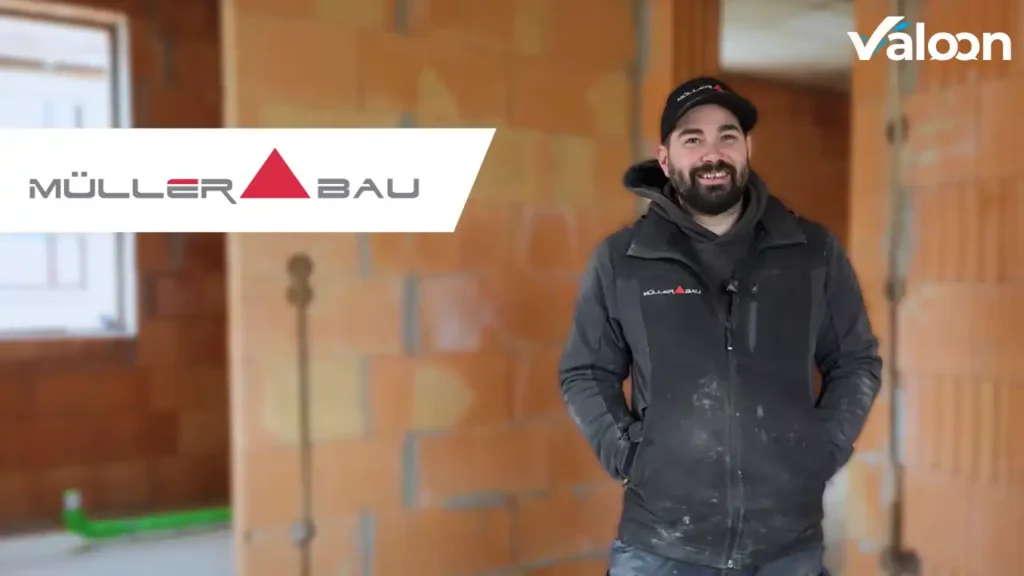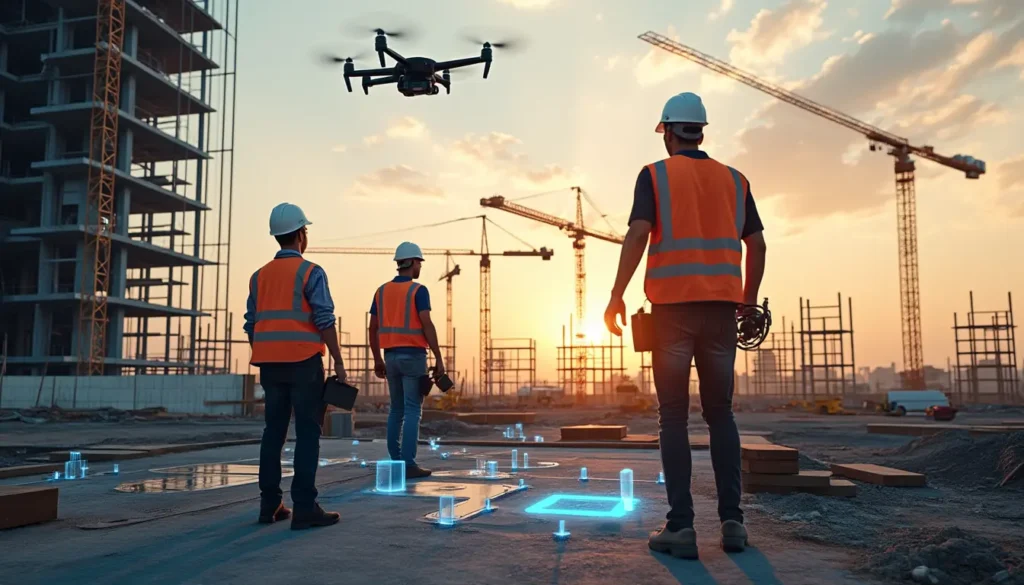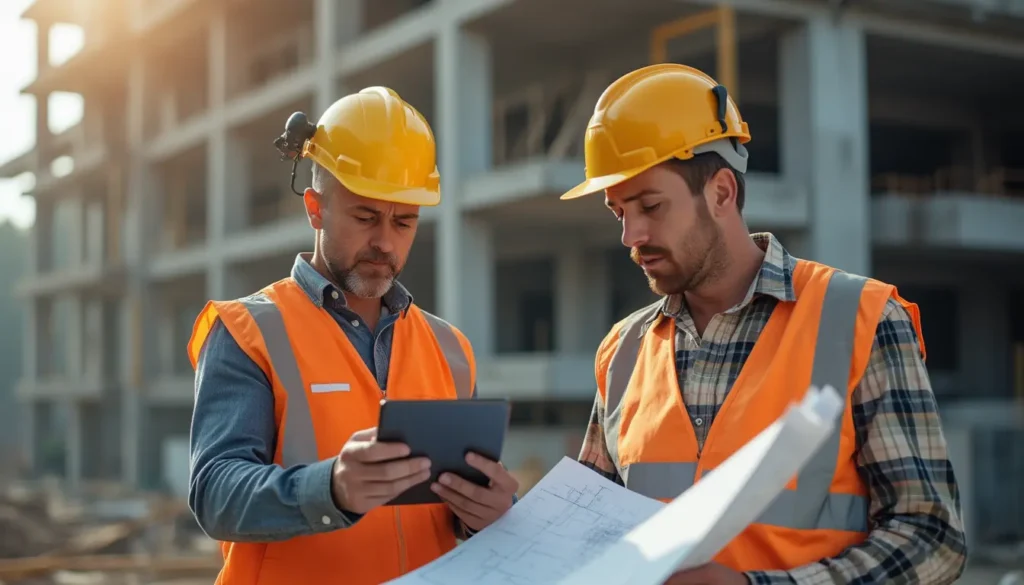Construction Industry in Transition: How to Set the Course for Your Success in 2024/2025
The construction industry is in motion – and how! Technological advancements, new market demands, and the ever-growing call for more sustainability are stirring things up. Those who keep track of the current trends in the construction industry have a clear advantage. That’s exactly what this article is about: we want to show you which developments you as a construction company should keep in mind now to remain successful tomorrow. We at Valoon GmbH know firsthand how important it is not only to be aware of these developments but also to have appropriate solutions ready – solutions that are genuinely tailored to the needs of the construction industry. Do you need a partner for the digitalization of your construction projects or do you want to elevate your communication to the next level? Then just reach out to us – we are happy to provide personalized advice..
- The construction industry is being transformed by technological advancements, new market demands, and the call for sustainability.
- Current challenges include a shortage of skilled workers, fluctuating material prices, and the housing crisis.
- Digital technologies such as BIM and AI offer enormous opportunities for increasing efficiency and reducing costs.
- Competence in trends, especially in digitalization and sustainability, secures competitive advantages.
Mastering challenges and opportunities in the current market environment
Sure, the construction sector is facing some hurdles: the ongoing shortage of skilled workers, fluctuating material prices, and the need to become more ecological are just a few. According to reports, the German construction industry had to accept another setback in orders and revenue in 2024. But where there is shadow, there is also light! Digital technologies like Building Information Modeling (BIM) and Artificial Intelligence (AI) offer huge opportunities to work more efficiently, reduce costs, and enhance quality. The current trends in the construction industry show clearly: The journey is towards digitalized, data-driven, and sustainable construction processes. A development of the construction industry, which cannot be ignored.
And then there’s the often-discussed housing crisis. With a projected deficit of up to 60% in completions compared to demand (we’re talking about 160,000 to 240,000 units built against a demand of 385,000 to 400,000), it’s clear: construction companies must rethink strategically and reposition themselves. We see great opportunities in ‘building in existing structures’ and in developing new, cost-effective housing concepts. Those who proactively address these specific trends in the construction industry challenges not only secure their survival but also open up growth opportunities. Another challenge that we at Valoon GmbH are passionately addressing is the promotion of the acceptance of new technologies. This is not always easy, especially in more traditional sectors. That’s why our software solutions are designed to be particularly user-friendly – making it as easy as possible to enter the realm of digitalization.
Securing competitive advantages through trend competence
Let’s be honest: Understanding the current trends in the construction industry trends and quickly adapting to them is no longer an option for construction companies, but a necessity to survive the tough competition. Those who strategically focus early on key issues such as digitalization in the construction industry and well-thought-out sustainability concepts can earn real and long-term advantages. The ability to react flexibly and well-informed to these developments is becoming increasingly vital for long-term success. Take BIM as an example: it’s much more than just new software. It requires real investments in training, software, hardware, and yes, also in adapting internal processes. A clean data foundation and smooth communication with clients and trades are essential.
Goal: A Compass for the Trends in the Construction Industry
With this article, we want to provide you with a compass – a comprehensive and practical overview of the most important trends in the construction industry for 2024 and 2025. We take a close look at what is moving the industry: the ongoing digitalization, the implementation of BIM, the growing importance of sustainability and ESG criteria, the potential of modular construction and industrial prefabrication, as well as the increasing influence of Artificial Intelligence (AI) in construction. Because only those who understand these diverse developments can make smart strategic decisions. We show you how these developments are turning traditional working methods upside down and what concrete steps your company can take to benefit from them. We at Valoon GmbH help you master these trends in the construction industry challenges. How? By transforming everyday messenger communication, for instance via WhatsApp, into structured and valuable project data. This enhances the flow of information and overall project management sustainably.Shortage of skilled workers? Here’s how to tackle it – with digitalization and BIM!
The shortage of skilled workers – a topic that is seriously affecting the German construction industry and often acts as a real brake. But instead of burying our heads in the sand, we prefer to look forward! Because digital tools and methods like Building Information Modeling (BIM) offer solid approaches to counteract and significantly improve efficiency at construction sites. The current trends in the construction industry make it clear: It is high time to act decisively here.
- The shortage of skilled workers, caused by demographics and out-migration, poses a significant challenge.
- Digital solutions such as automation and ERP systems can increase productivity and help address the shortage.
- Building Information Modeling (BIM) is revolutionizing planning and execution processes through digital twins.
- The promotion of digital competencies and modern work practices is essential to make the industry more attractive.
Address the acute shortage of skilled workers with intelligent strategies
Yes, the shortage of skilled workers construction industry has many faces and deep-rooted causes. One of them is demographic change: experienced veterans are retiring and the young talent for construction jobs is slow to arrive. We simply must make the industry more attractive to young talents again! Additionally, qualified people sometimes shift to other, supposedly cooler industries. This naturally intensifies the fight for good employees and drives up wage costs. The trends in the construction industry signal clearly: Without clever counter-strategies, capacities will continue to shrink. Studies also show that the lack of digital skills (in 32% of skilled workers) is a significant obstacle to digitalization on our construction sites.
Digitalization as an opportunity: Increasing efficiency through automation and intelligent systems
Digitalization is a real game-changer here! It offers us so many opportunities to outsmart the skilled worker shortage and boost productivity. A key point is the automation of routine tasks – creating space and increasing efficiency. Think mobile construction site apps or digital time tracking systems: they drastically reduce paperwork and assist in more accurate personnel planning. Strong systems are now essential to manage resources intelligently, optimize material use, and prevent bottlenecks. And there’s another aspect: By making the professional training and further education more digital, we also make the construction sector more exciting for young people by showcasing modern work practices and cool technologies. These trends in the construction industry are absolutely groundbreaking for the future of the construction industry..
BIM (Building Information Modeling): Revolutionizing Planning and Execution
Building Information Modeling (BIM) is much more than just a fleeting software trend – it is a complete method for holistic digital construction planning and execution. With BIM, we create a detailed digital twin of a building that consolidates all important information regarding the entire lifecycle. The advantages are obvious: fewer planning errors, optimized material consumption, shorter construction times, and much better collaboration among all participants. Nonetheless, there is still considerable room for improvement regarding the widespread use of BIM in the DACH region (Germany, Austria, Switzerland). The current trends in the construction industry clearly indicate: BIM is a key technology for the digital transformation in construction. And its potential is far from exhausted, especially when it comes to linking it with sustainability strategies and material optimization. By the way: We at Valoon GmbH make on-site data collection very simple – and this data can be seamlessly integrated into your BIM processes.Building greener, competing stronger: Smartly utilizing ESG, circular economy, and timber construction
Sustainability is no longer a fringe topic in the construction industry – on the contrary, it is increasingly becoming a true competitive advantage and a business necessity. Those who integrate ESG criteria, boost the circular economy, and increase reliance on renewable resources like wood are not only following important trends in the construction industrytrends but actively shaping the sector to be future-proof.
- The integration of ESG criteria (Environmental, Social, Governance) is becoming strategically more important for construction companies.
- The transition to a circular economy aims to reduce primary raw materials and minimize waste through recycling and upcycling.
- Regional sourcing and resource-saving construction methods are crucial for ecological and economic advantages.
- Timber construction offers significant potential for sustainable building as a renewable, CO2-binding resource that still needs to be better utilized.
ESG criteria (Environmental, Social, Governance) as a strategic imperative
The adherence to ESG criteria is becoming increasingly important for construction companies. And not just to meet legal requirements such as the Corporate Sustainability Reporting Directive (CSRD)! A well-thought-out sustainability strategy that integrates ecological, social, and business aspects is a clear plus for convincing investors and solidifying one’s good reputation. This also includes making emission data transparent and adjusting processes and supply chains. The trends in the construction industry show clearly: Companies that see sustainability as an integral part of their strategy are more successful in the long term. We at Valoon GmbH support you with digital documentation that helps you efficiently collect even ESG-relevant data.
Circular economy and resource efficiency: Minimizing waste, creating value
The shift towards a circular economy is another important trend that we should keep an eye on. The goal is clear: consume fewer primary raw materials and reduce waste as much as possible by recycling or upcycling construction materials. This not only conserves our environment but can also save money. A focus on regional sourcing is invaluable here: It reduces CO2 emissions through shorter transport routes and makes us less dependent on global supply chains, which can be quite vulnerable (keyword: material shortages). An energy and resource-saving construction method, which relies on and efficient building technology, is simply a must today. These trends in the construction industry require a rethink in planning and execution – but it’s worth it!
Timber construction: Unlocking the potential of a sustainable building material
Der Timber construction is a true beacon of hope when it comes to climate protection and resource-saving building. Wood is a renewable resource that binds CO2 during its growth, thereby actively contributing to reducing greenhouse gases. Thus, the sustainable construction industry is increasingly relying on this brilliant building material. Although we actually have enough wood in Germany, we are still not fully tapping the potential of timber construction, particularly in the multi-storey residential and object construction. What’s holding us back? Often, there is a lack of trained professionals, and sometimes persistent, outdated concerns regarding fire protection. Promoting timber construction through targeted educational programs, adapted building regulations, and honest clarification of its many advantages are important trends in the construction industrysteps to further enhance this sustainable material. And once again: Accurate documentation of construction progress, as enabled by our software at Valoon, is a tremendous advantage, especially in timber construction.Turbo for Your Projects: Modular Construction and Prefabrication as Efficiency Boosters
In light of the ongoing skilled worker shortage and rising cost pressures, modular construction and industrial prefabrication are increasingly coming into focus as key trends in the construction industry strategies. These trends in the construction industry are crucial, because these methods promise not only faster construction times and higher quality but also better resource utilization and more flexibility in planning and execution.
Industrial prefabrication as a key growth driver
Die Industrial prefabrication of building components is becoming one of the most important growth engines for the construction supply industry and the entire construction sector. The lack of skilled labor directly on construction sites accelerates this trend. This is because prefabrication in the factory is weather-independent and occurs under controlled conditions – the result is components of consistently high quality and precision. A brand new, parallel value creation chain with direct sales and industrial goods marketing, which stands apart from traditional, more craft-based models, is emerging. The standardization of components and processes is key to success, but it also requires us to rethink the entire value chain – from planning to assembly. These trends in the construction industry transform the way we plan and build buildings from the ground up and have a major influence on the development of the construction industry in 2024..
Modular construction: A quick and sustainable answer to the housing shortage
Das Modular construction, where entire space modules are prefabricated in the factory and only need to be assembled at the construction site, is a truly effective answer to the pressing housing shortage and the demand for faster, yet sustainable building solutions. Due to the flexible production of serially manufactured components, we can easily adapt to different requirements and drastically shorten construction times. This saves costs through more efficient material usage and shorter on-site times. Modular construction also spurs innovations in design and material use while minimizing weather influences and safety risks at the construction site. Digitalization plays a major role here, as it supports the precise planning and control of prefabrication processes. The trends in the construction industry indicate: Interest in this type of construction is steadily growing, even for larger projects.
3D printing in construction: From niche to industrial application
Der 3D printing in construction, especially with concrete, has exciting future potential, even though the technology is still in its infancy. Current trends in the construction industry indications suggest that 3D printing will be used less directly on construction sites but rather in the prefabrication of complex building components and forms. This technology allows us to quickly develop prototypes, manufacture individual components, and generate significantly less waste through precise material application. When 3D printing is combined with other digital tools such as BIM, further leaps in efficiency become possible. We at Valoon GmbH closely observe this development, as efficient communication and data collection are also absolutely crucial when integrating new manufacturing methods.
Important aspects of modular construction and prefabrication
To fully leverage the advantages of these construction methods, we should keep an eye on a few points:
- Standardization and systematization: The development of standardized modules and components is crucial for scalability and cost-effectiveness.
- Digital planning tools: Without BIM and other digital helpers, precise planning, coordination, and production control is almost impossible.
- Logistics and assembly: A cleverly thought-out logistics plan for transporting and assembling prefabricated elements on construction sites is critical for success.
- Quality assurance: Ongoing quality checks, both at the factory and on-site, ensure that standards are maintained.
The future is now: How AI, robotics, and digital twins will revolutionize your construction processes
The construction industry is currently experiencing a real wave of technological innovations that have the potential to significantly disrupt traditional processes. Artificial intelligence (AI), robotics, and digital twins are at the forefront – as central trends in the construction industrytools that can elevate efficiency, precision, and sustainability to a whole new level.
Artificial Intelligence (AI) in construction: Data-driven efficiency and optimized processes
Artificial intelligence (AI) is increasingly conquering areas of the construction industry and turning many things upside down. According to recent estimates, the market value of AI in construction was over $2.5 billion in 2022 – and it’s expected to grow by 20% annually! Today, 74% of companies are using AI in projects, primarily in design (48%) and planning (42%). AI-powered systems analyze large data sets to recognize patterns, optimize processes, and make predictions. The fields of application are diverse: from automated waste classification and recycling to optimizing construction workflows and resource usage, to predictive maintenance of machinery. The und dem Recycling über die Optimierung von Bauabläufen und des Ressourceneinsatzes bis hin zur vorausschauenden Wartung von Maschinen. Die trends in the construction industry indicate that 84% of companies plan to increase their AI investments in the next five years, although missing legal frameworks and lack of expertise sometimes slow down the adoption. We at Valoon GmbH focus on the automatic structuring of communication data – this is an important precursor to intelligent data analysis and thus supports the use of artificial intelligence in the construction industry..
Robotics and autonomous construction sites: Boosting productivity and relieving skilled workers
The use of robots and autonomous machines on construction sites is another promising trend to increase efficiency, enhance precision, and improve safety. Robots can take over monotonous, physically demanding, or dangerous tasks, thus relieving our skilled workers – a key contribution also in the fight against the shortage of skilled labor. Possible applications include bricklaying, welding, material transport, or inspecting hard-to-reach places. Although the demand for robotics in economic low construction is rising, the high costs in high construction still represent a challenge. The trends in the construction industry suggest that especially infrastructure projects will drive automation. The development towards the autonomous construction site is a long-term goal that we will gradually achieve through the integration of intelligent systems.
Digital Twins: Real-time data analysis and transparent visualization of construction projects
Digital twins are virtual replicas of actual buildings, systems, or even entire cities. They are fed with real-time data from sensors (IoT) and thus enable continuous monitoring, analysis, and simulation of construction projects and their operation. This technology revolutionizes our construction processes by creating a transparent data foundation for all stakeholders and allows us to visualize changes or conditions of buildings in real-time. In combination with BIM, digital twins can help reduce error rates, save material, and increase efficiency over the entire lifecycle of a building. The trends in the construction industry show a rapidly growing interest in this technology, as it enables more accurate planning, more efficient execution, and optimized building operation. We at Valoon GmbH support you in easily capturing the necessary data on the go.Stormy times, clear strategies: Mastering material shortages, data security, and climate risks
The construction industry is moving in an increasingly unstable environment. Material shortages, rising prices, new data security requirements, and the growing effects of climate change are challenging us. Successful companies need proactive strategies now to master these challenges and leverage the associated trends in the construction industry opportunities for themselves. Understanding these trends in the construction industry is essential for future viability.
Dealing with material shortages and price increases
Persistent material shortages, especially for raw materials like steel, petroleum products, and bitumen, as well as significant price increases pose real challenges for construction projects. The prices for new residential buildings have shot up significantly. A wise response is the prioritization of regional sourcing. This not only stabilizes supply chains but also reduces CO2 emissions through shorter transport routes – a win-win situation! Additionally, energy- and resource-saving construction methods, as well as excellent cash management, are essential to cushion cost increases and secure liquidity. The trends in the construction industry require a rethink towards more resilient supply chains and a more efficient handling of resources. The digital recording of material demand and consumption, as supported by our software at Valoon, can provide the necessary transparency.
Data security and integration as digital challenges
The ongoing digitalization brings us huge advantages but also poses new tasks in the area of data security and data protection.Especially when we integrate third-party messenger services or use cloud platforms, the highest security standards must apply – there’s no room for compromise. Another hurdle is often the complex integration of new digital solutions into existing, sometimes still analog systems and processes. Mastering these digitalization challenges requires not only technical know-how but also careful planning and well-trained staff. The trends in the construction industry show: Investments in cybersecurity and systems that can ‘talk’ to each other (interoperable systems) are essential. We at Valoon GmbH place the highest value on data security and seamless integration of our solutions – you can count on that.
Adapting to climate risks and promoting resilient construction methods
Climate change is altering the risk profile of real estate investments and construction projects. Factors such as heat islands in cities, water scarcity, and extreme weather events must be considered much more than before in planning and assessment. The integration of climate risk analysis into due diligence processes (i.e., careful examination prior to decisions) is an important step. Furthermore, it is crucial to promote climate-resilient construction methods – those that consider overheating protection, intelligent water management, and robust materials, for example. The trends in the construction industry indicate an increasing demand for buildings that are adapted to changing climatic conditions. The topic of climate insurance is also gaining importance, as many companies are still underinsured here.
Strategic approaches to tackling challenges
To effectively meet the complex challenges, construction companies should consider the following strategic approaches:
- Diversifying supply chains: Less dependence on individual suppliers and regions makes us more robust.
- Implementing lean construction management: Eliminate waste and optimize processes to increase efficiency – that’s what it’s all about.
- Investing in digital competencies: Preparing our employees for using new technologies and digital tools.
- Developing sustainability strategies: Integrating ESG criteria holistically into the business model.
Digital helpers with power: Software and platforms as the engine of your transformation
Software solutions and digital platforms are far more than just nice tools – they are the decisive enablers for change in the construction industry. They enable more efficient collaboration, optimize processes, and help companies like yours successfully address the diverse trends in the construction industry challenges and remain competitive.
CRM systems: Optimized customer communication and partner coordination
Customer Relationship Management (CRM) systems are becoming increasingly important in the construction industry. Why? Because they enable an optimized customer communication throughout the entire project lifecycle – from the initial inquiry to post-project support. But that’s not all: CRM systems also improve coordination with business partners and suppliers by keeping all relevant information centralized and readily available. The result: fewer misunderstandings, faster response times, and ultimately more satisfied customers. The trends in the construction industry show that professional customer care and retention are increasingly becoming success factors. We at Valoon GmbH understand how important structured communication is, and we offer solutions that seamlessly integrate into your overarching management systems.
Construction management tools for connected work and improved project coordination
Modern construction management tools, such as BauMaster or our own platform here at Valoon GmbH, are designed to enable truly seamlessly connected work for all project participants. They bridge the gap between office and construction site, close information gaps, and minimize misunderstandings. Features like centralized task management, digital data capture on-site (for example, via messengers like WhatsApp), intelligent reporting (think photo documentation, measurements, daily reports), and a cloud-based project repository are invaluable for managing the complexity of today’s construction projects. Such tools help you implement the current trends in the construction industry , by simplifying data collection and sustainably enhancing information flow. The construction industry in 2025 will be significantly shaped by such smart tools.
Cloud solutions: Flexibility, scalability, and automated collaboration
Cloud-based Software-as-a-Service (SaaS) platforms offer tremendous flexibility and scalability – and this applies to construction companies of all sizes. They allow access to project data and functions from anywhere, at any time. This is particularly convenient for companies with many employees in the field or at different locations. Cloud solutions make the collaboration in real-time child’s play and can automate many routine tasks. This notably increases the agility and efficiency of your construction projects. The integration of messenger services with advanced features like buttons, lists, and forms, as we offer at Valoon GmbH, is a great example of how cloud technology can simplify and structure communication. The trends in the construction industry show a clear trend: away from paperwork, towards mobile and cloud-based technologies that could finally put the paper-based construction process into retirement.Looking ahead: What will drive the construction industry until 2030 – and how you can shape the future
The construction industry is standing on the threshold of a decade that will bring profound changes. The trends in the construction industry, which will accompany us until 2030, are diverse and characterized by constant innovation. These trends in the construction industry include the development of new business models and a growing responsibility towards our climate goals. Companies that proactively position themselves and remain adaptable will emerge as winners from this transformation.
The necessity for continuous innovation and adaptability
In a rapidly changing market environment, the ability to continuously innovate and adapt is no longer a nice extra, but simply essential for survival. This applies not only to the introduction of new technologies but also to the optimization of processes, the development of new services, and the exploration of new markets. We must establish a culture of openness and learning within our companies to flexibly respond to unforeseen developments. The trends in the construction industry, such as neo-ecology – a solution-oriented approach to sustainability that connects ecological, social, and technological aspects – urges us to continually question existing practices. We at Valoon GmbH are committed to continuously evolving our software solutions to meet the changing needs of the construction industry.
Emergence of new business models and changing value chains
Digitalization and a strong focus on sustainability are leading to the emergence of new business models and changes in existing value chains. Platform economies, sharing models for construction machinery (think rental portals), data-driven services, and specialized providers for modular or sustainable construction concepts are gaining more and more importance. The traditional boundaries between planners, contractors, and operators are becoming increasingly blurred. The trends in the construction industry indicate a stronger interconnection and collaboration along the entire value chain. Companies must rethink their positioning and explore collaboration opportunities to succeed in these new ecosystems. The ability to intelligently utilize data and convert it into structured, valuable information – as our platform at Valoon enables – is becoming increasingly important.
The central role of the construction industry in achieving climate goals
The construction sector plays an absolutely central role when it comes to achieving global and national climate goals.Buildings account for a significant share of CO2 emissions and resource consumption – that’s a fact. The trends in the construction industry clearly show: The pressure to reduce our ecological footprint will continue to increase. This requires a massive expansion of energy-efficient building practices (keyword: Net-Zero buildings), increased use of renewable energy, consistent promotion of the circular economy (i.e., recycling and upcycling of construction materials), and greater utilization of CO2-binding materials such as wood. The construction industry has the responsibility, but also the huge opportunity to make a significant contribution to climate protection through innovative solutions. We at Valoon GmbH support this transformation through efficient digital processes that help conserve resources and make projects more sustainable.
Key areas of action for the construction industry until 2030
To set the course for a successful future, construction companies should prioritize the following areas of action:
- Investments in research and development: Actively promote new technologies, materials, and construction methods.
- Building digital competencies: Train employees and attract digital natives to the industry.
- Strengthening the circular economy: Develop and implement strategies for dismantling, reuse, and recycling.
- Promotion of collaborations: Build partnerships along the value chain to jointly develop innovative solutions.
The current trends in the construction industry clearly show: Digitalization, sustainability, and efficiency are the keys to success. Companies that take action now and implement innovative solutions secure crucial competitive advantages. We at Valoon GmbH are here to support you as a partner to optimize your communication and project management processes and make you fit for the future of the construction industry. . Take advantage of the opportunities presented by the transformation of the construction industry! Contact us today for personalized consulting and find out how our software can help you transform everyday messenger communication into structured project data and make your projects more efficient.
How can I effectively address the skills shortage in my construction business?
The skills shortage is a central challenge. One solution lies in the digitalization and automation of processes. Mobile construction site apps, like those offered by Valoon GmbH, simplify data collection and communication, allowing existing teams to work more efficiently and spend less time on administrative tasks. Additionally, the use of modern technologies increases the attractiveness of the industry for newcomers.
Is Building Information Modeling (BIM) also relevant and feasible for my medium-sized construction company?
Yes, BIM is increasingly relevant for SMEs. It enables better planning, reduces errors and material consumption.Getting started doesn’t have to be complex; begin with the digital capture of project data that can later be integrated into BIM processes. Solutions that convert unstructured data (e.g., from WhatsApp) into usable project data, like those from Valoon GmbH, significantly lower the entry barrier.
How can I practically implement sustainability (ESG) in my construction company without letting costs spiral?
Sustainability begins with resource efficiency and optimized planning.The digital documentation of material consumption and construction progress helps reduce waste and optimize resource use. Regional sourcing and a focus on durable materials are additional steps. Tools that provide a transparent project documentation also support the proof of ESG criteria, which in turn can increase competitiveness. kann.
What are the biggest advantages of modular construction and prefabrication for my company?
Modular construction and prefabrication offer significant time savings through parallel manufacturing in the factory and on the construction site. They lead to higher quality through controlled manufacturing conditions and can reduce costs through optimized material usage.Additionally, weather dependency is reduced, and work safety is improved.
What concrete benefits does Artificial Intelligence (AI) already bring to my construction company today?
AI can already help to optimize processes and improve decisions.One example is the automatic structuring of communication data, as enabled by Valoon GmbH. This creates a clean data foundation for later AI analyses, e.g., for pattern recognition in construction processes or for optimizing resource use. The automated translation of communication can also overcome language barriers.
How can I ensure that digitalization supports my employees rather than overwhelming them?
The key lies in easy-to-use and intuitive solutions.Focus on technologies that integrate into familiar workflows. Using familiar tools like WhatsApp for professional data collection, as enabled by Valoon GmbH, lowers acceptance barriers and reduces training effort. The focus must be on simplifying daily work. liegen.
How can I make communication between the construction site and the office more efficient and avoid information losses?
A central platform that consolidates and structures information in real-time, is crucial. When field workers can easily capture data via messenger and this data is automatically transformed into project tasks and reports, the information flow is accelerated and misunderstandings are reduced.Valoon GmbH specializes precisely in optimizing the communication and making project data usable..
What first step should I take towards digitalization if my budget is limited and I want to see quick results?
Start with the optimization of communication and mobile data collection.Introducing a simple solution for digital capture of daily reports, photo documentation, or measurements directly from the construction site via smartphone can already bring significant efficiency gains and reduce paperwork.Solutions that build on existing messenger services are often cost-effective and quick to implement..
